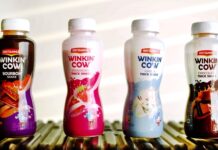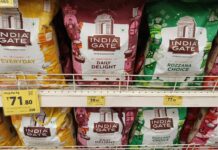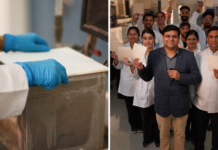
Following successful commercial consumer testing in 2022, Tetra Pak and Lactogal have now launched an aseptic beverage carton featuring a paper-based barrier. This is part of a large-scale technology validation, involving around 25 million packages and currently ongoing in Portugal. Made of approximately 80% paperboard, the package increases the renewable content to 90%, reduces its carbon footprint by one third (33%1) and has been certified as Carbon Neutral by the Carbon Trust.
Greenhouse gas emissions, food waste and plastic littering are cited as the top three environmental sustainability concerns facing food and beverage (F&B) businesses today, and this is expected to remain the case over the next five years. Packaging solutions like these, that expand the amount of paper and lower the carbon footprint, while ensuring food safety, can help the industry overcome these challenges, Tetra Pak said.
In 2015, Tetra Pak was the first in the industry to introduce a package made fully from plant-based renewable materials – paperboard and sugarcane-based plastic. The Tetra Rex® Plant-based package, suitable for cold chain distribution, is fully renewable, and the company has delivered approximately 6.5 billion of these packages to customers around the world to date.
Now, the launch of the Tetra Brik Aseptic 200 Slim Leaf carton with paper-based barrier, together with Lactogal, provides a package that can be distributed under ambient conditions, while hitting the 90% renewable content mark. This brings Tetra Pak one step closer to its ambition of a beverage carton made solely from responsibly sourced renewable or recycled materials, fully recyclable and carbon neutral. The company is aiming for industrial scale production of the solution by 2025.
José Capela, president of Lactogal, said: “Our collaboration with Tetra Pak centers on a shared belief that a more sustainable future is possible. Innovating together is a big part of that. We are both focused on an ambitious sustainability transformation, and this new carton’s 33% reduction in greenhouse gas emissions4, together with its Carbon Neutral certification by the Carbon Trust™, is a significant achievement towards this goal.”
Ola Elmqvist, executive vice-president Packaging Solutions, Tetra Pak adds: “The development represents a critical marker in our longstanding work to design beverage cartons for recycling – something that is continuing to set the pace for the paperization of packaging. By joining forces with Lactogal, we’re now demonstrating that it’s possible to progress the sustainability of aseptic beverage cartons while securing food safety and enhancing food access.”
In 2022, together with its industry partners in the Alliance for Beverage Cartons and the Environment (ACE), Tetra Pak jointly adopted Design for Recyclability guidelines for beverage cartons, which provide technical guidance for optimised recycling of this type of packaging. More recently, the 4evergreen alliance added beverage packaging design guidance to its fiber-based circularity toolset. 4evergreen is a cross-industry platform that aims to boost the contribution of fibre-based packaging in a circular and sustainable economy, with Tetra Pak among its founding members. Their updated Circularity by Design Guideline covers fiber-based composite packaging types (including beverage cartons) and informs designers on their compatibility with specialized recycling processes.
IndiFoodBev — authentic, impactful and influential
An English-language food and beverage processing and packaging industry B2B platform in print and web, IndiFoodBev is in its third year of publication. It is said that the Indian food and beverage industries represent approximately US$ 900 billion in revenues which implies more than 20% of the country’s GDP. Eliminating the wastage on the farmside can help to deliver more protein to a higher number of the population apart from generating sizable exports. The savings in soil, seeds, water, fertilizer, energy and ultimately food and nutrition could be the most immense contribution that country is poised to make to the moderation of climate change.
To improve your marketing and grow sales to the food and beverage processing and packaging industry, talk to us. Our research and consulting company IppStar [www.ippstar.org] can assess your potential and addressable markets in light of the competition. We can discuss marketing, communication, and sales strategies for market entry and growth.
Suppliers and service providers with a strategy and budget for targeted marketing can discuss using our hybrid print, web, video, and social media channels to create brand recognition linked to market relevance. Our technical writers are ready to meet you and your customers for content.
The second largest producer of fruit and vegetables in the world is continuously expanding processing capacities and delivery systems with appropriate innovative technologies. We cover product and consumer trends, nutrition, processing, research, equipment and packaging from farm to thali. Get our 2025 media kit and recalibrate your role in this dynamic market. Enhance your visibility and relevance to existing markets and turn potential customers into conversations. Ask for a sample copy of our bi-monthly in print or our weekly IndiFoodBev eZine each Wednesday.
For editorial info@ippgroup.in — for advertisement ads1@ippgroup.in and for subscriptions subscription@ippgroup.in
Naresh Khanna – 10 February 2025
Subscribe Now










